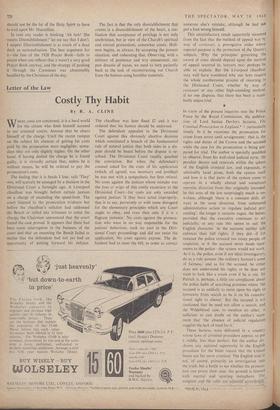Letter of the Law
Costly Thy Habit
By R. A. CLINE
WHERE costs are concerned, it is a hard world for the citizen who finds himself accused in our criminal courts. Assume that he clears himself of the charge: Until the recent rumpus on the subject his chances of getting his costs paid by the prosecution were negligible; nowa- days they are only slightly higher. On the other hand, if having denied the charge he is found guilty, it is virtually certain that, unless he is without means, he will be ordered to pay the prosecution's costs.
The feeling that it, is heads I lose, tails 'They' win, will scarcely be assuaged by a decision in the Divisional Court a fortnight ago. A Liverpool chauffeur was brought before certain justices on a charge of exceeding the speed-limit. The court listened to the prosecution evidence but before the chauffeur's solicitor had addressed the Bench or called any witnesses to rebut the charge, the Chairman announced that the court found the case proved. It appears that there had been some interruption in the business of the court and that on resuming the Bench failed to realise that the defendant had not yet had an opportunity of putting forward his defence. The chauffeur was later fined £2 and it was ordered that his licence should be endorsed.
The defendant appealed to the Divisional Court against this obviously abortive decision which constituted a breach of the fundamental rule of natural justice that both sides in a dis- pute should be heard before the dispute is re- solved. The Divisional Court readily quashed the conviction. But when the defendant's counsel asked for. the costs of his application (which, all agreed, was necessary and justified) he was met with a sympathetic but firm refusal. No costs against the justices whose mistake was the tons et origo of this costly excursion to the Divisional Court—for costs are only awarded against justices 'if they have acted ithproperly, that is to say, perversely or with some disregard for the elementary principles which any Court ought to obey, and even then only if it is a flagrant instance.' No costs against the prosecu- tion who were in no way responsible for the justices' behaviour, took no part in the Divi- sional Court proceedings and did not resist the application. No costs against anyone. The de- fendant had to meet the bill, in order to correct someone else's mistake, although be had not put a foot wrong himself.
This unsatisfactory result apparently stemmed from the fact that the method of appeal was by way of certiorari, a prerogative order whose especial purpose is the protection of the Queen's subjects. Why the principles governing the award of costs should depend upon the method of appeal resorted to, lawyers may perhaps he able to explain. But the Liverpool chauffeur may well have wondered why our laws require the whole cumbersome process of resorting to the Divisional Court, whether by way of certiorari or any other high-sounding method. if no one disputes that there has been a mani- festly unjust trial.
IN VIEW of the present inquiries into the Police Force by the Royal Commission, the publica- tion of Lord Justice Devlin's lectures, The Criminal Prosecution in England.* is particularly timely. In it he examines the prosecution for crime from arrest until arraignment : that is, the 'rights and duties of the Crown and the accused while the case for the prosecution is being pre- pared for trial. The author is specially qualified to observe, from his well-sited judicial eyrie, the peculiar decays and renewals within the sphere of the English criminal law, and expounds. in admirably lucid prose, both the system itself and how it is that parts of the system come to operate in a wholly altered and sometimes opposite direction from that originally intended. In this area of the law surprisingly much is un- written, although 'there is a constant drift, al- ways in the same direction, from unfettered administrative action to regulate judicial pro- ceeding': the longer it remains vague, the better, provided that the executive continues to act judicially; at any rate this seems to suit the English character. At the moment neither side enforces .their full rights; if they did—if for instance the police arrested too many people on suspicion, or if the accused never made state- ments to the police—the system would not work. As it is, the police, even if not ideal investigators, do as a rule possess 'the ordinary layman's sense of fairness,' and as for the accused, he either does not understand his rights or he does not want to look like a crook even if he is one. Sir Patrick is, perhaps, a little too complacent about the police habit of searching preMises where 'the accused is as unlikely to insist upon his right to immunity from search as he is on his constitu- tional right to silence.' But the accused is not cautioned that he need not allow a search; and the Wildeblood case, to mention no other, is sufficient to cast doubt on the author's state- ment that 'the absence of judicial regulation suggests the lack of need for it.'
These lectures were delivered in a country whose laws of criminal procedure appear, to put it mildly, less than perfect; but the author dis- claims any national superiority in the English procedure for the blunt reason that the United States are far more criminal. The English trial is not, of course, primarily an investigation into the truth, but a battle to see whether the prosecu- tion can prove their case: the ground is littered with martial and sporting metaphors. Vic,. is capons and the rules are adjusted accordinglY.,.,
'10,1.J.P.. 15s.)






































 Previous page
Previous page